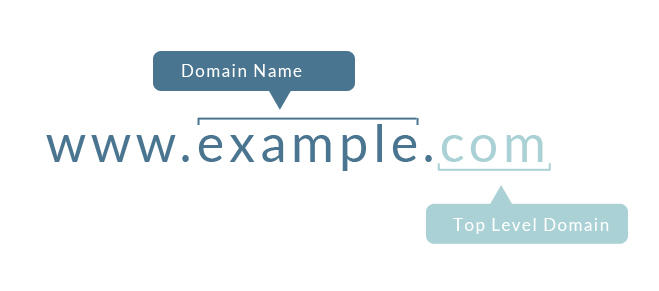
While third-party publishing platforms and Facebook pages offer ways to establish an online presence, owning your own domain name is a smart move for both personal blogs and business websites. A domain name puts you in control of your brand and the content you create. If you’ve ever wondered, “Why do I need a domain name?”, this guide from the experts at Bluehost will explain the importance of a domain name, what it is, and why it’s essential for starting a successful website.
What Is a Domain Name?
A domain name is an online address that provides a user-friendly way to access a website’s true online locator: its Internet Protocol (IP) address. An IP address is a unique string of numbers and characters used across the Internet to access websites from any device or location. However, IP addresses are hard to remember and type correctly, so a domain name offers a word-based format that is much easier for users to handle. When a user types a domain name into a browser’s search bar, the browser uses the corresponding IP address to access the site.
Domain names consist of a unique name chosen by the user and an extension, such as .com, .net, or .org, which designates the site’s Top Level Domain (TLD).
You can check domain name availability
through various domain name checkers provided by domain registrars and web hosting providers. Each domain name must be unique, so you cannot use a name that is already taken. However, with many new TLDs available, you have numerous combinations to choose from for your new site. It is even possible to buy an existing domain name from its current owner or from a marketplace or domain auction site that brokers unwanted or unused names at varying prices.
The cost of buying and registering a domain name can range from as little as $10 USD to thousands of dollars for a highly sought-after name. New, unusual TLDs like .me or .bio can cost more than the familiar .com or .net, but these extensions might be perfect for expressing your brand in a unique way. Once you have a unique name in mind, you can register it through an independent domain registrar or the company you choose to host your new website. Even if you don’t have a website yet, you can still claim ownership of your ideal name and hold it until you’re ready to set up a site.
Why Should You Get a Domain Name?
The online world offers numerous opportunities to create a business or blog on free or paid hosting sites, or even on social media. Platforms like Facebook, BlogSpot, and Medium allow users to post content and images, while online marketplaces like Shopify and Etsy provide storefronts for entrepreneurs to sell goods. Services like Squarespace enable creatives to set up online portfolios without building a website from scratch.
While these platforms make it possible to have an online presence without owning your own domain, they come with significant drawbacks if your goal is to increase visibility and build authority for your brand. Purchasing your own domain name helps you avoid these issues and provides greater control and credibility for your online presence.
A Domain Name Is Unique and Searchable
When you create a page or account on a third-party website hosting site or favorite social media platform, you often receive a subdomain on the hosting site’s domain, such as hostsite.com/yourname. However, this can result in a lengthy and forgettable address depending on where you post your content.
In contrast, your own domain name, especially with the widely recognized .com extension, effectively communicates your identity and purpose in a memorable way. It’s important to choose a domain name that clearly reflects your purpose and is easy for users to recall. Avoid numbers and hyphens, as they can complicate the memorability of your custom domain. When registering a domain, opt for simple, direct, and creative options that leave a lasting impression.
A Domain Name Has Authority
Using a third-party blogging or social media platform to host your content may appear unprofessional and can hinder your efforts to establish a business or professional identity. These platforms are often associated with personal blogs and casual sharing, making it challenging to position your site as a credible and authoritative source in your field. This is where registering your own domain name becomes crucial. Having your own domain name signals to potential customers and clients that you are a legitimate business with long-term goals and commitments.
You Control Your Domain
Relying on third-party platforms to host your content can pose risks. These platforms might shut down unexpectedly, potentially taking your content and online identity with them. Additionally, some platforms assert ownership over posted content, restricting your ability to transfer it elsewhere. In contrast, owning your own domain name grants you the flexibility to choose any web hosting provider worldwide. This concept, known as “self-hosting”, ensures that your content remains under your control and can be moved to a different hosting provider as needed.
By purchasing a domain name, you secure exclusive rights to that name as long as you continue to renew it. Many experts recommend registering not only your primary domain but also variations and alternate spellings to safeguard your online identity comprehensively. This approach ensures that your site remains uniquely identifiable across various search queries and platforms.
While having a domain name is not essential for establishing an online presence, it empowers you with control over your online identity and content. Owning your own domain is essential for instilling confidence in your brand or business and maintaining autonomy over your digital footprint.
3.5
